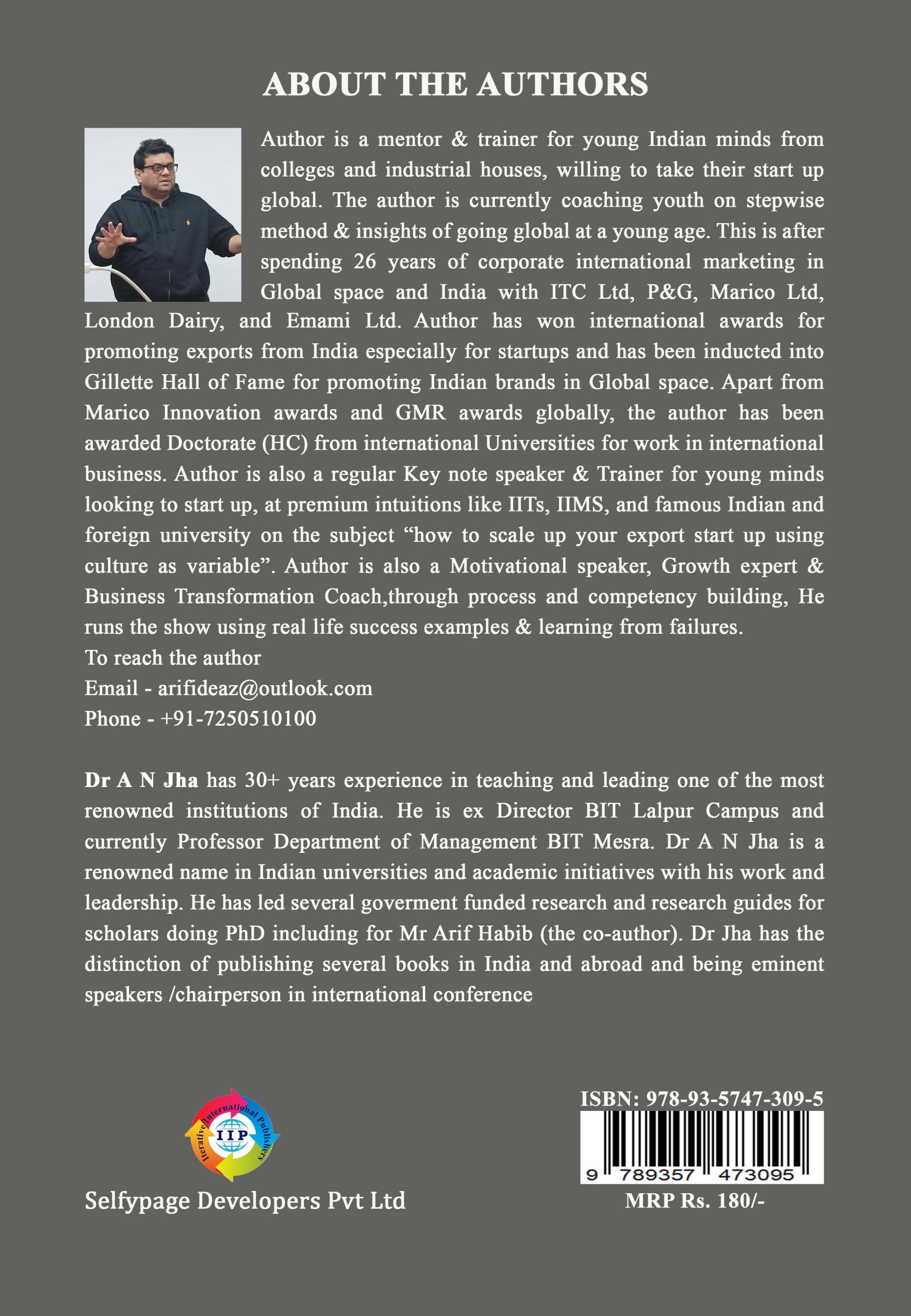As established corporate businesses & young startups
cross their domestic geographical boundary, they start facing
the biggest challenge of adaptation to cultural reality in the
country of entry both in terms of consumer culture and
employee culture. For a long time it was believed that
teaching cross cultural difference reality would automatically
make corporate managers adapt to consumer and employee
reality on the country. Foreign Cross – Culture difference has
been taught through Geert Hofstede model but the on ground
reality led to the need to bridge the gap between academic
research and actual challenges of localization on the ground.
The new insight among corporate and academic researchers is
that we might possess best of knowledge of cultural
differences but we can struggle to as we attempt to put this
knowledge into localization reality. We have written this book
because we believe that there is serious gap in what has been
written about cross cultural management and what corporates
in foreign markets struggle on the ground with regards to
cultural localization.
There are other aspects of culture in global business,
which not a threat but opportunity in nature. Understanding
the cultural insights of consumers and employees in target
foreign country can help us develop innovative disruptive
products for that country which is adapted from domestic
market. Secondly employee cultural adaptation adds to
productivity in a big way. Thirdly creating cultural diversity
in foreign country for a company, is now been associated with
disruptive innovations as ideas rub off with each other to
generate a complete insurgent product & people which leads
to exponential growth in exports / international business.
iv
There two key reasons for choosing this subject for this
book – one being the insights collected from “Cross- Cultural
Localization” initiatives by Indian MNCs in foreign markets
and second being existing research about impact of “Cross-Cultural Localization” by American MNCs on Business
performance in foreign markets. Firstly, let us look at first
hand insights about impact of Cross- Cultural Localization on
business performance, for Indian MNCs in foreign markets.
Marico suffered heavy losses in first year of acquisition in
Egypt, by implementing Domestic “Cross- Cultural”
Employee Culture of “Egalitarianism & Freedom” in a highly
“Hierarchical & Dictatorial” Egyptian Employee Culture, till
Marico made amends by adapting itself to local Cross-Cultural reality, leading to a turnaround of business in second
/subsequent years.
Similarly, Dabur failed miserably with losses in first few
years in Middle East, imposing domestic Indian Consumer
Culture to Arab consumers through domestic product line, till
the “Cross- Culture Consumer localization” in fourth year, by
bringing localized consumer need driven products, like Dabur
Miswak toothpaste, Dabur Hammam Zaith, and Dabur Henna,
doubling the business in that year, followed by 45%+ CAGR
in subsequent years. In fact, today Indian MNCs like Dabur,
Marico and to some extent Emami dominate the personal care
consumer space in Middle East Africa region purely on basis
of Cultural adapted localization of products and people
strategy. At the same time Indian MNCs like Wipro, Himalya
and Godrej have negative CAGR i.e poor business
performance reportedly due to lack of Cross- Cultural
Localization in Middle East. Further, it has to be pointed out
that such insights suffer from absence of documented case
studies & documented academic research. Hence this reported
v
impact of “Cross-Cultural Localization” by Indian MNC on
their business performance in foreign markets, needs to be
tested, measured and then documented as a template for future
Indian global startups and existing Indian MNCs. Secondly,
one of the best experts in field of Cross-Cultural Training and
authors of the book “Managing across Cultures”, Solomon &
Schell, write with specific American MNC examples, that
despite having best of Technological, Marketing and Finance
competency, a MNC cannot realize its full business potential
if it does not understand, appreciate, and then adapt to cross-cultural differences in the foreign market. Andy Molinsky in
his latest book, Global Dexterity – how to adapt across
cultures, has also emphasized that he would have not
researched or written this book had he not found a gap in
existing research on Cross- Cultural Localization impact on
business performance. These two academic premises, hence
also need to be urgently tested in context of Indian MNC in
foreign markets, so as to provide a template to new Indian
MNC start-ups, who are quickly expanding in foreign
markets.
The recent global research, namely “Culture &
Bottomline” by Solomon & Schell, “Global Dexterity” by
Andy Molinsky, has brought “Cross-Cultural Localization”
agenda to forefront giving it equal or even higher importance
than Tech, Marketing, and Finance in International Business,
and with a view that without Cross-Cultural Localization,
business would fail in foreign markets. To explain this further
the “Cross- Culture Localization” measurement, as suggested
by these two eminent researchers, has to be by two variables
i.e firstly “Cross- Cultural Score – Consumer” and secondly.
“Cross – Culture Score- Employee” in foreign market vs
domestic markets. The premise is that these two variables can
vi
be measured and then co-related with business performance,
through a process of primary and secondary research. The
other issue is that most of academic and corporate research
material on Cross- Cultural Localization is only available for
American MNCs and not for Indian MNCs in foreign market,
which is the prime reason of inducting this research topic and
presenting a thesis on same to provide a template for future
Indian startups going to foreign markets and also for corporate
academic partnership to further establish it for a series of
countries instead of limited scope of this thesis. The
Corporates are willing to further fund research on this subject
since the scope of this thesis is limited to one domestic market
(India) and one foreign market (Saudi Arabia) due to lack of
resources. To sum, there is a research gap – in terms of
absence of primary research on Culture Score for Indian MNC
stepping from domestic to foreign market, and establishing
the correlation of “Cross- Cultural Localization” with
business performance. In the words of Andy Molinsky
(Harvard Business Review 2023), the key variables to be
measured in this case has to be “Cross Cultural Score”, “Cross
Cultural Adaptation Score” and the “Business performance
Index of MNCs”. These three variables hence need to be
measured & co-related for future reference of Indian MNCs &
Indian Startups going global. Such a study should then follow
with ideal “Cross-Cultural Localization” models for each level
of “Cross Cultural Difference” measured, forming an
Localization tool for International Business managers from
India.
The above executive summary summarizes the entire
research in a nutshell, with Current Research, The Research
Gaps identified, the Derived objectives, Null Hypothesis,
Range of Significance of measurement, Research Design,
vii
Finding, Conclusion and Recommendation. The research gap
leads to identification of objectives i.e. measurement of
Culture scores and Culture adaptation scores through using
Primary research dashboard of Culture Wizard Model © and
then co-relate them with Business Performance sourced from
AC Nielson global reports. The Cultural Difference Score are
found to be significant at 2.2-2.7 & P value less than 0.05
rejecting the null hypothesis. The Cultural adaptation score is
found to have positive co-relation of 0.82-0.88 with business
performance concluding that cultural adaptation done by
Indian MNCs directly impacts business performance. The
recommendation is a Cross-Cultural Adaptation model for
each level of Cultural Difference with both Employee and
Consumer adaptation recommendations so that business
success is ensured.









Reviews
There are no reviews yet.